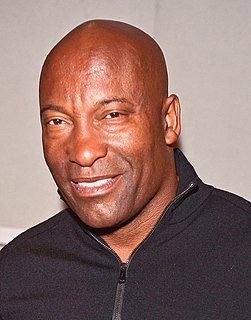A Quote by Wole Soyinka
The British inclined more towards the feudal mentality, the feudal structures rather than the more radical progressive elements who would re-shape society and institute pretty egalitarian systems of governance with opportunity for even disadvantaged people and so I found that decolonisation was not just the end of political struggle in Nigeria.
Related Quotes
America's egalitarian mandate reflects the liberality of the creator, and thus countermands, by divine witness, all feudal and aristocratic structures. It also parallels the Jewish concept of repair the world, or Tikkun ha'olam, which holds that the human spirit is in partnership with God to help finish the work of creation.
Adam Smith is an egalitarian, he believed in equality of outcome, not opportunity. He is an enlightenment figure, pre-capitalist. He says, suppose in England, one landowner got most of the land and other people would have nothing to live on. He says it wouldn't matter much, because the rich land owner, by virtue of his sympathy for other people would distribute resources among them, so that by an invisible hand, we would end up with a pretty egalitarian society. That is his conception of human nature.
Feudalism is an economic system where a few people own all the land and the others have no option but to be serfs on such a feudal estate. We now condemn feudalism. We condemn not merely the feudal lords but we condemn the whole structure of rules that sustained feudalism. I am asking people to think similarly about the world economy.
Clement Attlee, the man who led us out of the rubble of the Second World War and into a more modern, egalitarian Britain, is one of this country's greatest Prime Ministers. One major reason for this is that he was better able to recognise the wants and needs of the British people than some of his more polished political contemporaries.
For 40 years, my argument has been that democratizing ownership of wealth has been the key to egalitarian society and the goals of egalitarian society. But you start at the local level, both at the workplace, community and other institutions and you reconstruct the egalitarian democratized structure as well as participatory structure. And as this happens, we learn more how to move toward the vision that is much larger than just the community level.
The process of decolonisation in Nigeria was a very untidy one. The British, when they were leaving finally and knew exactly who they wanted to take over, they wanted pliant government, figures, structures, they wanted to continue indirectly in effect their control over much of their colonial possessions and this was one of the very early causes of conflict.
So the idea was that, some catastrophic event had happened. There was a long dark age and then out of that, 100 years ago in this world, seven barons - these men and women - rose up and formed the new society. It's a feudal world, a part feudal barons and part warlord and part mob boss and they each control a huge resource so that there's an uneasy alliance, but they all need each other.
The more people share woodland, absorb it and regard it as part of their personal heritage and culture, the richer our society will be. The more people can work in woods and use them practically rather than go through the motions as a kind of ersatz exercise, the more they will care for the places themselves rather than the political idea of them.






































